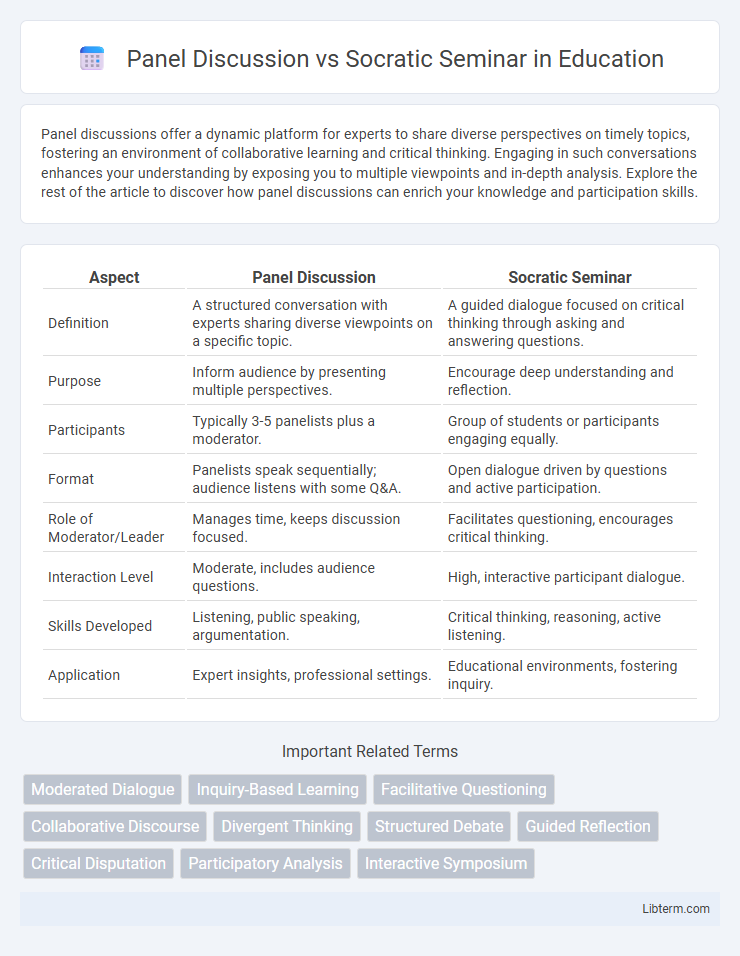Panel discussions offer a dynamic platform for experts to share diverse perspectives on timely topics, fostering an environment of collaborative learning and critical thinking. Engaging in such conversations enhances your understanding by exposing you to multiple viewpoints and in-depth analysis. Explore the rest of the article to discover how panel discussions can enrich your knowledge and participation skills.
Table of Comparison
| Aspect | Panel Discussion | Socratic Seminar |
|---|---|---|
| Definition | A structured conversation with experts sharing diverse viewpoints on a specific topic. | A guided dialogue focused on critical thinking through asking and answering questions. |
| Purpose | Inform audience by presenting multiple perspectives. | Encourage deep understanding and reflection. |
| Participants | Typically 3-5 panelists plus a moderator. | Group of students or participants engaging equally. |
| Format | Panelists speak sequentially; audience listens with some Q&A. | Open dialogue driven by questions and active participation. |
| Role of Moderator/Leader | Manages time, keeps discussion focused. | Facilitates questioning, encourages critical thinking. |
| Interaction Level | Moderate, includes audience questions. | High, interactive participant dialogue. |
| Skills Developed | Listening, public speaking, argumentation. | Critical thinking, reasoning, active listening. |
| Application | Expert insights, professional settings. | Educational environments, fostering inquiry. |
Introduction to Collaborative Discussion Formats
Panel discussions feature a group of experts who share diverse perspectives on a topic in a structured format, promoting dynamic interaction and real-time audience engagement. Socratic seminars emphasize critical thinking through methodical questioning, encouraging participants to explore ideas collaboratively and deeply rather than presenting fixed viewpoints. Both formats foster collaboration, but panel discussions prioritize expert dialogue, while Socratic seminars center on participant-driven inquiry and reflective discussion.
Defining a Panel Discussion
A panel discussion is a structured conversation where a group of experts share insights on a specific topic before an audience, often guided by a moderator who facilitates questions and manages time. This format emphasizes expert opinions, diverse perspectives, and audience interaction, creating a dynamic exchange of ideas. Unlike a Socratic seminar that centers on open-ended questioning and collective dialogue among participants, panel discussions prioritize authoritative viewpoints within a planned framework.
What is a Socratic Seminar?
A Socratic Seminar is a student-centered discussion method designed to deepen understanding through open-ended questions and critical thinking, where participants actively engage in dialogue based on a shared text. Unlike a panel discussion, which features a group of experts presenting and responding to audience questions, a Socratic Seminar emphasizes collaborative inquiry and reflective listening without a formal moderator. This method fosters analytical skills by encouraging participants to build on others' ideas and challenge assumptions in a respectful, evidence-based environment.
Core Objectives and Purposes
Panel discussions aim to present diverse expert opinions on a topic, fostering an informative exchange that informs and engages the audience. Socratic seminars focus on deepening understanding through guided, thoughtful dialogue based on open-ended questions, encouraging critical thinking and collaborative exploration of ideas. Both methods enhance learning but differ in format: panels prioritize expertise dissemination while Socratic seminars emphasize inquiry and reflective discussion among participants.
Structure and Participant Roles
Panel discussions feature a structured format with a moderator guiding a small group of experts who present diverse viewpoints to an audience. Socratic seminars emphasize a collaborative dialogue where participants engage in open-ended questioning and critical thinking, often with shared facilitation. Panel participants typically act as speakers or respondents, while in Socratic seminars, everyone actively contributes as both questioners and listeners.
Questioning Techniques Compared
Panel discussions utilize open-ended questions to elicit diverse perspectives from experts, fostering dynamic group interaction and broad topic exploration. Socratic seminars emphasize probing, analytical questioning that encourages deep critical thinking and self-reflection among participants, often following a text or concept closely. The questioning in Socratic seminars is more iterative and dialectical, designed to challenge assumptions and promote dialogue, whereas panel discussions prioritize varied viewpoints and real-time responses.
Advantages of Panel Discussions
Panel discussions offer diverse expert perspectives in a dynamic, interactive format that encourages audience engagement and real-time question-and-answer sessions. They foster a collaborative environment where panelists can challenge ideas and build on one another's insights, enhancing the depth of understanding on complex topics. This format efficiently addresses multiple viewpoints, making it ideal for conferences, workshops, and educational settings seeking practical solutions and varied expertise.
Benefits of Socratic Seminars
Socratic seminars foster deep critical thinking by encouraging participants to question assumptions and explore multiple perspectives through open-ended dialogue. This method enhances active listening and collaboration skills, promoting a deeper understanding of the subject matter. Unlike panel discussions, Socratic seminars prioritize participant-driven inquiry, resulting in more meaningful engagement and sustained intellectual growth.
Choosing the Right Format for Your Goals
Panel discussions offer diverse expert perspectives and dynamic interaction, ideal for exploring multiple viewpoints and engaging a broad audience. Socratic seminars emphasize deep critical thinking and dialogue through open-ended questions, best suited for developing analytical skills and fostering reflective exploration of complex ideas. Selecting the format depends on whether the goal is broad exposure and interaction in panel discussions or in-depth, collaborative inquiry in Socratic seminars.
Conclusion: Making Informed Discussion Choices
Choosing between a Panel Discussion and a Socratic Seminar depends on the desired outcome: Panel Discussions provide diverse expert insights suitable for information dissemination and audience engagement, while Socratic Seminars foster critical thinking through open-ended questioning and collaborative dialogue. Evaluating objectives like knowledge depth, participant interaction, and discussion format helps determine the optimal method for effective communication. Selecting the appropriate format enhances the quality and impact of discussions in educational and professional settings.
Panel Discussion Infographic

 libterm.com
libterm.com